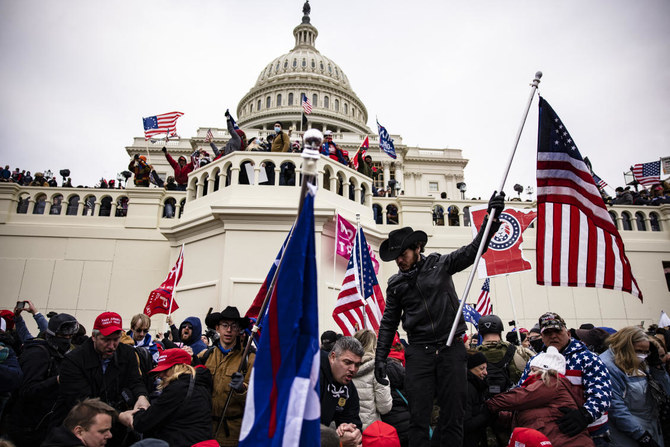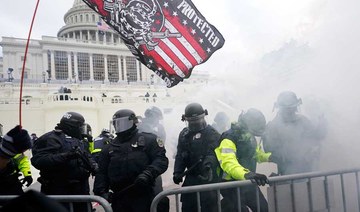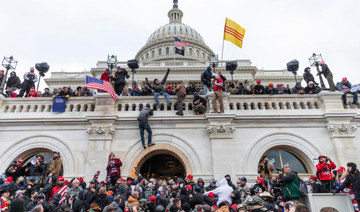PHOENIX: They flaunted their participation in the Jan. 6 riot at the US Capitol on social media and then, apparently realizing they were in legal trouble, rushed to delete evidence of it, authorities say. Now their attempts to cover up their role in the deadly siege are likely to come back to haunt them in court.
An Associated Press review of court records has found that at least 49 defendants are accused of trying to erase incriminating photos, videos and texts from phones or social media accounts documenting their conduct as a pro-Donald Trump mob stormed Congress and briefly interrupted the certification of Democrat Joe Biden’s election victory.
Experts say the efforts to scrub the social media accounts reveal a desperate willingness to manipulate evidence once these people realized they were in hot water. And, they say, it can serve as powerful proof of people’s consciousness of guilt and can make it harder to negotiate plea deals and seek leniency at sentencing.
“It makes them look tricky, makes them look sneaky,” said Gabriel J. Chin, who teaches criminal law at the University of California, Davis.
One such defendant is James Breheny, a member of the Oath Keepers extremist group, who bragged in texts to others about being inside the Capitol during the insurrection, authorities say. An associate instructed Breheny, in an encrypted message two days after the riot, to “delete all pictures, messages and get a new phone,” according to court documents.
That same day, the FBI said, Breheny shut down his Facebook account, where he had photos that he taken during the riot and complained the government had grown tyrannical. “The People’s Duty is to replace that Government with one they agree with,” Breheny wrote on Facebook on Jan. 6 in an exchange about the riot. “I’m all ears. What’s our options???”
Breheney’s lawyer, Harley Breite, said his client never obstructed the riot investigation or destroyed evidence, and that Breheny didn’t know when he shut down account that his content would be considered evidence.
Breite rejected the notion that Breheny might have been able to recognize, in the days immediately after Jan. 6 when the riot dominated news coverage, that the attack was a serious situation that could put Breheny’s liberty at risk.
“You can’t delete evidence if you don’t know you are being charged with anything,” Breite said.
Other defendants who have not been accused of destroying evidence still engaged in exchanges with others about deleting content, according to court documents.
The FBI said one woman who posted video and comments showing she was inside the Capitol during the attack later decided not to restore her new phone with her iCloud content — a move that authorities suspect was aimed at preventing them from uncovering the material.
In another case, authorities say screenshots from a North Carolina man’s deleted Facebook posts contradicted his claim during an interview with an FBI agent that he didn’t intend on disrupting the Electoral College certification.
Erasing digital content isn’t as easy as deleting content from phones, removing social media posts or shutting down accounts. Investigators have been able to retrieve the digital content by requesting it from social media companies, even after accounts are shut down.
Posts made on Facebook, Instagram and other social media platforms are recoverable for a certain period of time, and authorities routinely ask those companies to preserve the records until they get court orders to view the posts, said Adam Scott Wandt, a public policy professor at John Jay College of Criminal Justice who trains law enforcement on cyber-based investigations.
Authorities also have other avenues for investigating whether someone has tried to delete evidence.
Even when a person removes content from an account, authorities may still get access to it if it had been backed up on a cloud server. People who aren’t involved in a crime yet were sent incriminating videos or photos may end up forwarding them to investigators. Also, metadata embedded in digital content can show whether it has been modified or deleted.
“You can’t do it,” said Joel Hirschhorn, a criminal defense lawyer in Miami who is not involved in Capitol riot cases. “The metadata will do them in every time.”
Only a handful of the more than 500 people across the US who have been arrested in the riot have actually been charged with tampering for deleting incriminating material from their phones or Facebook accounts.
They include several defendants in the sweeping case against members and associates of the Oath Keepers extremist group, who are accused of conspiring to block the certification of the vote. In one instance, a defendant instructed another to “make sure that all signal comms about the op has been deleted and burned,” authorities say.
But even if it does not result in more charges, deleting evidence will make it difficult for those defendants to get much benefit at sentencing for accepting responsibility for their actions, said Laurie Levenson, a professor at Loyola Law School.
Some lawyers might argue their clients removed the content to lessen the social impact that the attack had on their families and show they do not support what had occurred during the riot. But she said that argument has limits.
“The words ‘self-serving’ will come to mind,” Levenson said. “That’s what the prosecutors will argue — you removed it because all of a sudden, you have to face the consequences of your actions.”
Matthew Mark Wood, who acknowledged deleting content from his phone and Facebook account that showed presence in the Capitol during the riot, told an FBI agent that he did not intend on disrupting the Electoral College certification.
But investigators say screenshots of two of his deleted Facebook posts tell a different story.
In the posts, Wood reveled in rioters sending “those politicians running” and declared that he had stood up against a tyrannical government in the face of a stolen election, the FBI said in court records. “When diplomacy doesn’t work and your message has gone undelivered, it shouldn’t surprise you when we revolt,” Wood wrote. His lawyer did not return a call seeking comment.
Even though she is not accused of deleting content that showed she was inside the Capitol during the riot, one defendant told her father that she was not going to restore her new phone with her iCloud backup about three weeks after the riot, the FBI said.
“Stay off the clouds!” the father warned his daughter, according to authorities. “They are how they are screwing with us.”
US Capitol rioters accused of erasing content from social media, phones
https://arab.news/8w65h
US Capitol rioters accused of erasing content from social media, phones

- Experts say the efforts to scrub the social media accounts reveal a desperate willingness to manipulate evidence once these people realized they were in hot water
- Only a handful of the more than 500 people across the US who have been arrested in the riot have actually been charged
NGOs warn Elon Musk of ‘collective punishment’ if Starlink in Sudan is shut down

- People and organizations rely on ‘unofficial’ Starlink connection for lifeline services
- Coalition of 94 humanitarian, human rights groups call for warring factions to repair damaged communication infrastructure
LONDON: Starlink’s chief Elon Musk has been urged not to shut down the satellite internet service in Sudan, as doing so could “collectively punish” millions of Sudanese.
In an appeal to the American billionaire, nearly 100 humanitarian, civil society, human rights organizations and members of the #KeepItOn coalition have highlighted the critical role Starlink plays as a lifeline for on-the-ground organizations operating in the war-torn African country. They warn that interrupting the service could have fatal consequences.
“Any shutdown of telecommunication services is a violation of human rights and may be considered to be a collective punishment that will not only isolate individuals from their support networks but also exacerbate the already dire economic situation facing millions,” said the coalition, which includes Save the Children, Islamic Relief Worldwide and Action Against Hunger, among others.
The statement added: “The potential shutdown of Starlink would have a disproportionate impact on civilians and the aid organisations who are trying to reach them.”
Sudan has been grappling with a widespread telecommunications blackout for several months, severely limiting emergency and humanitarian services and access to basic transactions such as cash transfers from abroad.
Starlink, which can operate across borders thanks to its satellite service, announced earlier this month that it would cease its services in Sudan by restricting roaming in jurisdictions where it is not licensed.
If confirmed, this decision risks provoking a permanent nationwide telecommunications shutdown, similar to the one in February 2024 that left almost 30 million Sudanese without access to the internet or telephone calls for more than a month.
The situation is further exacerbated by the damage and destruction of communication infrastructure, targeted by both the Rapid Support Forces and the Sudanese military.
The coalition, which relies on expensive and scarce satellite internet in areas where formal telecommunications are not functioning, has also urged the warring factions to repair the infrastructure.
SpaceX’s Starlink has been under pressure to maintain its connection since conflict broke out in Sudan in April 2023.
In August, a hacking group called Anonymous Sudan took X offline in more than a dozen countries to pressure Elon Musk into formally opening Starlink in Sudan.
In recent months, the company has been at the center of a public debate over its role in connecting war-torn areas worldwide.
Earlier in May, Bloomberg reported that SpaceX was close to finalizing a deal with the Yemeni government to provide satellite internet to the country in what experts described as a “victory” over the Houthi rebels.
In September 2023, several media outlets reported that Elon Musk denied a Ukrainian request to extend Starlink’s coverage to Crimea during a surprise attack.
Although this was later clarified as an erroneous claim that Musk “turned off” Starlink coverage in Crimea, it raised concerns about the service’s role during conflicts.
Dentsu opens sports practice in MENA with Riyadh HQ

DUBAI: International advertising group Dentsu has announced the launch of its dedicated sports practice, dentsu Sports International, in the Middle East and North Africa region.
The new practice, which focuses on sports marketing and analytics services, will be headquartered in Riyadh, Saudi Arabia, with additional offices in the UAE.
To provide end-to-end service to clients, the group brings together three dentsu businesses: dentsu Sports International Commercial, MKTG Sports + Entertainment and dentsu Sports Analytics.
Charlie Wylie, managing director for Europe, Middle East and Africa at dentsu Sports International, said: “dentsu Sports International will serve as a strategic sports and entertainment arm of dentsu in MENA, offering comprehensive solutions tailored to the needs of brands and rights holders.”
The company has appointed Olaf Borutz as vice president of commercial development, reporting to dentsu Sports International’s global chief commercial officer, Echo Li.
Borutz’s previous role as head of sports and events at law firm Al Tamimi & Company saw him advise clients on sports and events-related commercial matters, including government bodies, rights holders, agencies and players of the Saudi Pro League and Qatar Stars League.
“The appetite for sports marketing in the Kingdom is at an all-time high, with Saudi’s ambitions and investment in this space only expected to grow,” said Tarek Daouk, CEO, dentsu MENA.
A significant 62 percent of Saudi sports fans say that sport plays a bigger role in their lives than before, according to a new study conducted by dentsu Sports International.
The study also found that fans spend more time and money than their international counterparts on live events in the Kingdom, with Saudi fans attending an average of six events in person a year, more than the UK average of two events per year.
Saudi Arabia’s significant youth population is passionate about sports, with 68 percent of 18–24-year-old Saudis saying they find attending sports events more rewarding than other entertainment events.
The study also revealed that these younger consumers are the most likely to purchase premium tickets, spending 31 percent more a ticket than older fans.
Daouk said: “It’s an exciting time for sports in the region and we are thrilled to launch dentsu’s bespoke sports and entertainment offering.”
Tunisia remands journalists arrested over critical comments

- Broadcaster Borhen Bssais and political commentator Mourad Zeghidi were arrested Saturday under a decree criminalizing ‘spreading false information’ among other charges, spokesman Mohamed Zitouna said
TUNIS: A Tunisian court on Wednesday ordered two journalists to be held in remand until the completion of investigations into critical comments, a court spokesman said.
Broadcaster Borhen Bssais and political commentator Mourad Zeghidi were arrested Saturday under a decree criminalizing “spreading false information” among other charges, spokesman Mohamed Zitouna said.
Zeghidi is being investigated over social media statements last February and a post in support of Mohamed Boughalleb, another journalist and critic of President Kais Saied who has been detained separately.
Bssais was arrested on accusations of “having harmed President Kais Saied through radio broadcasts and statements” online between 2019 and 2022, according to his lawyer Nizar Ayed.
Their trial is set to begin on May 22, according to their lawyers.
Both media figures are prosecuted under a law ratified by Saied in September 2022.
The law punishes people with up to five years in prison for the use of social media to “produce, spread (or) disseminate ... false news” and “slander others, tarnish their reputation, financially or morally harm them.”
Journalists and opposition figures have said it has been used to stifle dissent.
Since the decree came into force, more than 60 journalists, lawyers and opposition figures have been prosecuted under it, according to the National Union of Tunisian Journalists.
The same night Bssais and Zeghidi were taken into police custody, masked police raided the Tunisian bar association and arrested lawyer Sonia Dahmani, also on the same law.
On Monday, another lawyer was forcibly arrested at the association’s headquarters.
The president of the bar, Hatem Meziou, on Tuesday called for an end to “the abuse of power” and “violence” targeting the lawyers.
The European Union also expressed concern over a string of arrests of civil society figures in Tunisia — the latest sign of a tightening clampdown on freedoms under Saied.
Nongovernmental organizations have decried a rollback of freedoms in Tunisia since Saied began ruling by decree after a sweeping power grab in 2021.
‘Blockout’ trend targets celebrities over Gaza silence

- Selena Gomez, Zendaya and Kim Kardashian are among the celebrities who have lost hundreds of thousands of followers
- Boycott campaign gained traction following Met Gala event last week in New York
LONDON: A new trend threatening to boycott celebrities over their refusal to speak out about the Gaza conflict is gaining momentum on social media.
Known as “Blockout 2024,” the movement has surged in popularity following the Met Gala last week.
As part of a solidarity campaign, social media users are calling for the blocking of accounts of celebrities who have remained silent on the humanitarian crisis in Gaza.
High-profile figures such as Taylor Swift, Justin Bieber, and Drake are among the hundreds of celebrities facing this “digital guillotine.”
A full list is circulating on social media, leading to a significant loss of followers on Instagram and other platforms.
Actress and singer Selena Gomez reportedly lost 1 million followers on Instagram and 100,000 on X, according to US-based social media analytics site Sonic Blue.
Fellow actress and singer Zendaya, reality TV star Kim Kardashian, and her sister Kylie Jenner have also seen hundreds of thousands of followers drop.
Pro-Palestinian activists have been pressuring celebrities for months to show more support for Gaza civilians. This growing discontent reached a tipping point last week when the Met Gala’s glitz and glamour coincided with Israel’s announcement of a military offensive in Rafah.
@ladyfromtheoutside #greenscreen #greenscreenvideo #digitine #digitalguillotine #haleyybaylee ♬ original sound - Meagan
The movement was sparked by a TikTok video from influencer Haley Kalil at the Met Gala on May 7, where she lip-synced to the phrase “Let them eat cake.”
This phrase, attributed to Queen Marie Antoinette, drew parallels to the French Revolution, symbolizing indifference to the suffering of the impoverished.
“It’s time for the people to conduct what I want to call a ‘digital guillotine.’ A ‘digitine,’ if you will,” said TikTok creator @ladyfromtheoutside, who kicked off the movement with her viral video.
“It’s time to block all the celebrities, influencers and wealthy socialites who are not using their resources to help those in dire need. We gave them their platforms. It’s time to take it back, take our views away, our likes, our comments, our money.”
According to Gaza authorities, at least 35,000 people, mostly women and children, have been killed in the Palestinian territory during the seven-month war, which has been widely condemned as failing to comply with international humanitarian law.
BBC investigation leads to arrest of one of world’s most notorious people smugglers

- Barzan Majeed, nicknamed ‘Scorpion,’ is caught in Iraqi Kurdistan days after release of BBC podcast series by journalists who tracked him down and interviewed him
- Senior local official confirms officials used information from the broadcaster’s investigation to help find fugitive believed to have helped smuggle thousands of people to UK
DUBAI: Kurdish security forces arrested Barzan Majeed, described as one of the world’s most notorious people smugglers, in Iraqi Kurdistan on Sunday morning.
Nicknamed “Scorpion,” the fugitive is believed to have been involved in smuggling an estimated 10,000 people across the English Channel to the UK. He was arrested days after the release of a BBC podcast series in which investigative journalists tracked him down to the city of Sulaymaniyah in Iraq and interviewed him there.
During the interview, Majeed said he had lost count of the number of people he helped to smuggle, adding: “Maybe a thousand, maybe 10,000. I don’t know, I didn’t count.”
He admitted that between 2016 and 2019 he was one of two people who helped run a people-smuggling operation in Belgium and France but denied he was the mastermind of the operation.
“A couple of people, when they get arrested, they say, ‘We’re working for him’ — they want to get less (of a) sentence,” he said.
Originally from Iraq, Majeed moved to the city of Nottingham, in England, in 2013 but was deported two years later. He had been on the run since failing to appear at a court in Belgium for a sentencing hearing in November 2022.
The UK’s National Crime Agency issued a warrant for his arrest that same year. The agency, which confirmed his arrest, said: “We are grateful to the BBC for highlighting his case and remain determined to do all we can to disrupt and dismantle the criminal networks involved in smuggling people to the UK, wherever they operate.”
A senior member of the Kurdistan Regional Government confirmed its officials had used information from the BBC investigation to locate and arrest Majeed.
Each year, thousands of people flee Iraq, including its Kurdistan Region, in the hope of finding a better life in the UK or other parts of Europe. In many cases, they pay people smugglers to transport them, but the routes and methods used by the smugglers are often dangerous and the migrants face harsh weather and potentially deadly travel conditions.
Germany deported 222 Iraqi citizens in the first three months of this year as part of an alleged agreement between Berlin and Baghdad to deport migrants who do not qualify to remain in Germany, media organization Rudaw, which is based in Iraqi Kurdistan, reported this week.





















